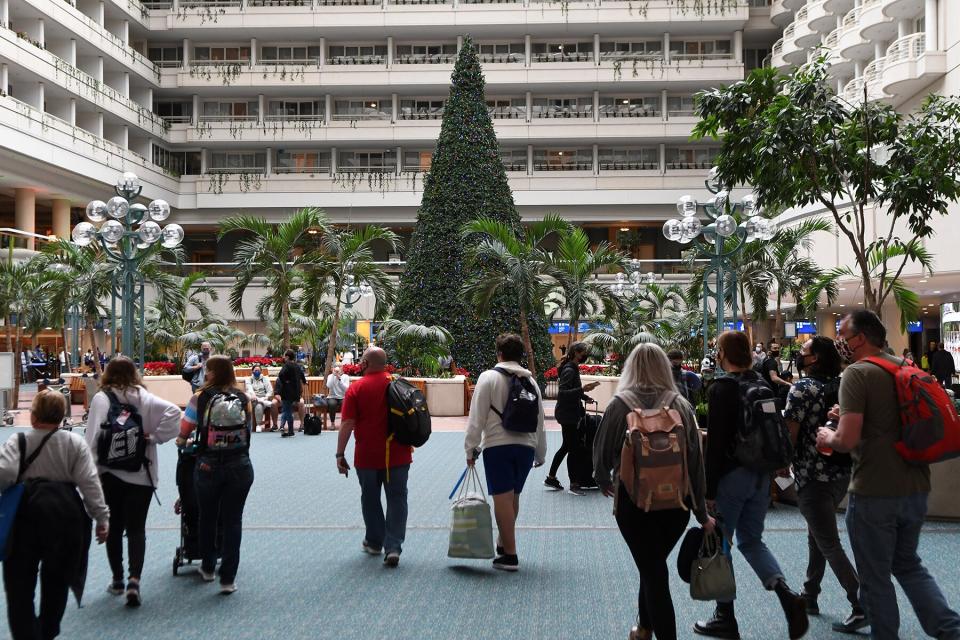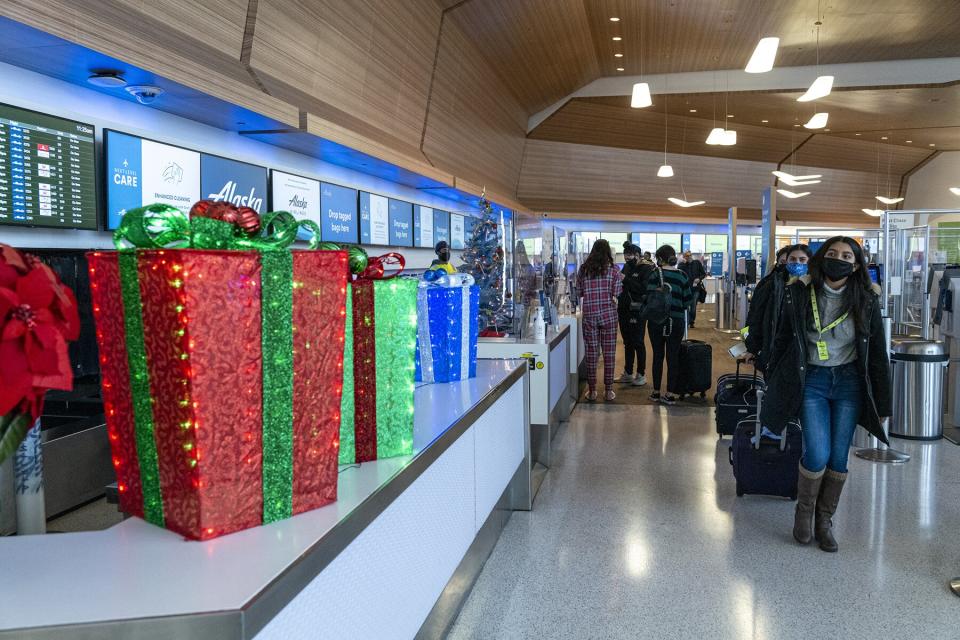Questions about Omicron and Holiday Travel? Here's What You Should Know

Paul Hennessy/Getty Images
The holidays are upon us and that means festive decor, special treats, and plenty of people taking to the roads and skies.
But while millions of people are expected to travel for Christmas this year, the emergence of the new omicron wave that has swept the world is throwing many plans into question and travelers into a holding pattern.
"At least right now, the vast majority are in a wait and see mode," said Scott Keyes, the founder of Scott's Cheap Flights told Travel + Leisure when chatting about traveling amid the new variant of COVID-19.
This is everything travelers should know about the omicron variant along with holiday travel safety tips to take with them on the way.
What is the omicron variant?
The new variant first emerged in southern Africa and was reported to the World Health Organization on Nov. 24. Two days later, the WHO designated omicron a "Variant of Concern" due to its "large number of mutations, some of which are concerning." But much still remains unknown.
Many countries, including the United States, were quick to ban travel from southern African countries and implement new travel restrictions, yet the variant has continued to spread around the world. So far, it has been detected in more than 20 U.S. states, according to the Centers for Disease Control and Prevention.
There are still many questions about how contagious and how deadly the variant is, but the CDC said it will likely spread "more easily than the original SARS-CoV-2 virus."
"More data is needed to know if omicron infections, and especially reinfections and breakthrough infections in people who are fully vaccinated, cause more severe illness or death than infection with other variants," the agency wrote. "With other variants, like Delta, vaccines have remained effective at preventing severe illness, hospitalizations, and death. The recent emergence of omicron further emphasizes the importance of vaccination and boosters."
Is omicron the dominant variant in the U.S.?
No, not even close.
The U.S. is currently averaging more than 100,000 cases on a seven-day moving average, according to the CDC. Of those, the delta variant accounts for more than 99% of all cases in the country.
How many people have been vaccinated in the U.S.?
In total, 71.4% of the U.S. population has received at least one dose of a vaccine, and 60.4% are fully vaccinated. Only 24.4% have received a booster shot, according to the CDC.
In Vermont, for example, 74.4% of the population is fully vaccinated. But several states have vaccinated under 50% of their populations, including Georgia, Alabama, Mississippi, Louisiana, North Dakota, Wyoming, and Idaho.
Is it safe to travel?

Daniel Slim/Getty Images
That's the million-dollar question. And, unfortunately, the answer is experts don't know.
"We don't have really great data yet. We don't have the real-world data of how people who are actually vaccinated do when they encounter omicron," Dr. Gigi Gronvall, a senior scholar at Johns Hopkins Center for Health Security, told Travel + Leisure. "We have little patches of data, but people should withhold judgment both on the extreme worry and the no worry spectrum."
Gronvall said travelers should take the same simple precautions they should be taking in everyday life, like getting vaccinated and wearing masks.
"Everybody has different risk tolerances. There are things you can do to reduce your risk," she said. "You can get vaccinated, you can get a booster shot, you can use rapid tests to make sure you're not infectious."
However, the WHO has urged at-risk groups not to travel to areas with community transmission, including people who aren't fully vaccinated and are at increased risk of developing severe disease or dying like those 60 years old or older.
Should Americans get tested before or after a trip?

Paul Hennessy/Getty Images
It's generally not a bad idea.
"If you are about to get on a flight and you're going to see some family when you disembark, getting a PCR test within 24 or 48 hours is a good step," Gronvall said. "But if you're driving up to see a family member and you're able to test that morning with a rapid antigen test, that's also a good idea."
International travelers — including U.S. citizens returning from abroad — are now required to get tested within one day of boarding a flight to the U.S. Travelers can use either a COVID-19 PCR or a rapid antigen test, according to the CDC. Qualifying at-home tests that have been issued an Emergency Use Authorization by the Food and Drug Administration and are supervised virtually by a telehealth provider may also be used.
For fully-vaccinated travelers, the CDC recommends people get tested three to five days after returning from an international trip, and self-monitor for COVID-19 symptoms after returning from a domestic trip.
The agency recommends unvaccinated travelers get tested one to three days before a trip as well as three to five days after returning from either an international or domestic trip. Unvaccinated travelers should also self-quarantine for a full seven days, even if they test negative.
Are people canceling holiday trips because of the omicron variant?
Not really — at least not yet.
While many people recently surveyed were concerned about the omicron variant messing up their holiday plans, 87% of them are going ahead with holiday travel anyway, according to a study from Scott's Cheap Flights. As for the rest, 10% canceled or postponed their plans, and 3% changed their destination.
But while most people aren't canceling trips they already booked, Keyes said interest in booking new international flights "really plummeted overnight" following the announcement of the omicron variant. That may mean cheaper flights down the line.
"If we should be so lucky that omicron turns out to be far less dangerous or deadly than many folks initially thought, then you might actually see some impact where the airlines are offering some really cheap flights, especially internationally," around February and March, he said. "The flip side here is if the omicron variant seems especially bad… you might actually see this to the benefit of domestic travel."
Do travelers need to be vaccinated to fly on a plane?
No, but travelers do have to wear a mask.
In fact, the federal transportation mask mandate, which was first implemented in January, has been extended until at least March 18, 2022. The order requires travelers to wear a mask on all forms of public transportation, including on planes, in airports, on trains, and on buses.
How busy will the airports be for Christmas?

David Paul Morris/Getty Images
Record numbers of people passed through U.S. airports over Thanksgiving and the Transportation Security Administration anticipates "near pre-pandemic travel volumes" to continue through the Christmas season.
"We see a strengthening in the airline travel industry toward pre-pandemic levels and our goal is to ensure you as the passenger have a safe and secure flight," TSA Administrator David Pekoske said in a statement on Tuesday. "We work hard with our airport and airline partners to achieve this by ensuring screening operations meet the upcoming demand."
About 2 million travelers are expected to pass through U.S. airports each day over the Christmas holiday, or around 80% of 2019 levels, according to Hopper. That is lower than before the pandemic, but not necessarily something the average traveler will notice when they're trying to get through the airport rush, Adit Damodaran, an economist at Hopper, told T L.
"We're ramping up even more… because we now have domestic travel [that] has mostly recovered and international travel is also starting to pick up," he said. "For all intents and purposes, when you're at the airport, it's going to feel like 2019."
Do travelers need to be vaccinated to get on a cruise?
Each cruise line has a different policy when it comes to vaccines and testing.
Norwegian Cruise Line, for example, has one of the strictest policies, requiring 100% of passengers and crew to be fully vaccinated to sail — a policy the company has extended "indefinitely" — as well as mandating passengers get tested before boarding.
Others, like Disney Cruise Line, require all passengers 12 and up to be fully vaccinated to sail. Starting next year, the company will drop that requirement to all children 5 years old and older.
Should travelers expect flight cancellations and delays?

Angus Mordant/Bloomberg via Getty Images
Unfortunately, probably. Widespread flight cancellations have plagued major airlines in recent weeks, including Southwest and American Airlines, due to a combination of bad weather and staffing woes. And experts say that's likely going to continue.
"That's sort of the friction that we expect with demand ramping up so quickly this year. In some ways, it is unprecedented to have to ramp up service so quickly," said Damodaran. "I would expect [cancellations] to happen occasionally, especially on a busy travel weekend, but it's hard to predict when those occurrences could happen."
So, should you book a backup flight?
No. A new concept called "trip stacking" has emerged this year in which travelers book multiple trips or flights for the same time period in case one gets canceled or needs to be postponed. But when it comes to flights, experts told T L they don't recommend it.
Ellen Edmonds, a spokeswoman for AAA, said it's a risky move that could end up costing customers a non-refundable ticket, and may even be flagged by the airline since many carriers have systems in place to spot duplicate bookings. Instead, she said the best way to protect a trip is to invest in travel insurance.
For its part, Hopper offers customers the option of adding on a "flight rebooking guarantee," which costs $24 on average and allows customers to book a new flight to their destination on any airline if theirs is canceled or delayed by more than one hour.
With more people traveling, does that mean things will be more expensive?
Simply put, yes. Rental car prices, for example, have surged mostly due to demand, but Edmonds said there is hope.
"The sooner you can lock in a rate, whether it's a rental car, flight, or hotel, you'll get a better [price]," she said.
Alison Fox is a contributing writer for Travel + Leisure. When she's not in New York City, she likes to spend her time at the beach or exploring new destinations and hopes to visit every country in the world. Follow her adventures on Instagram.

